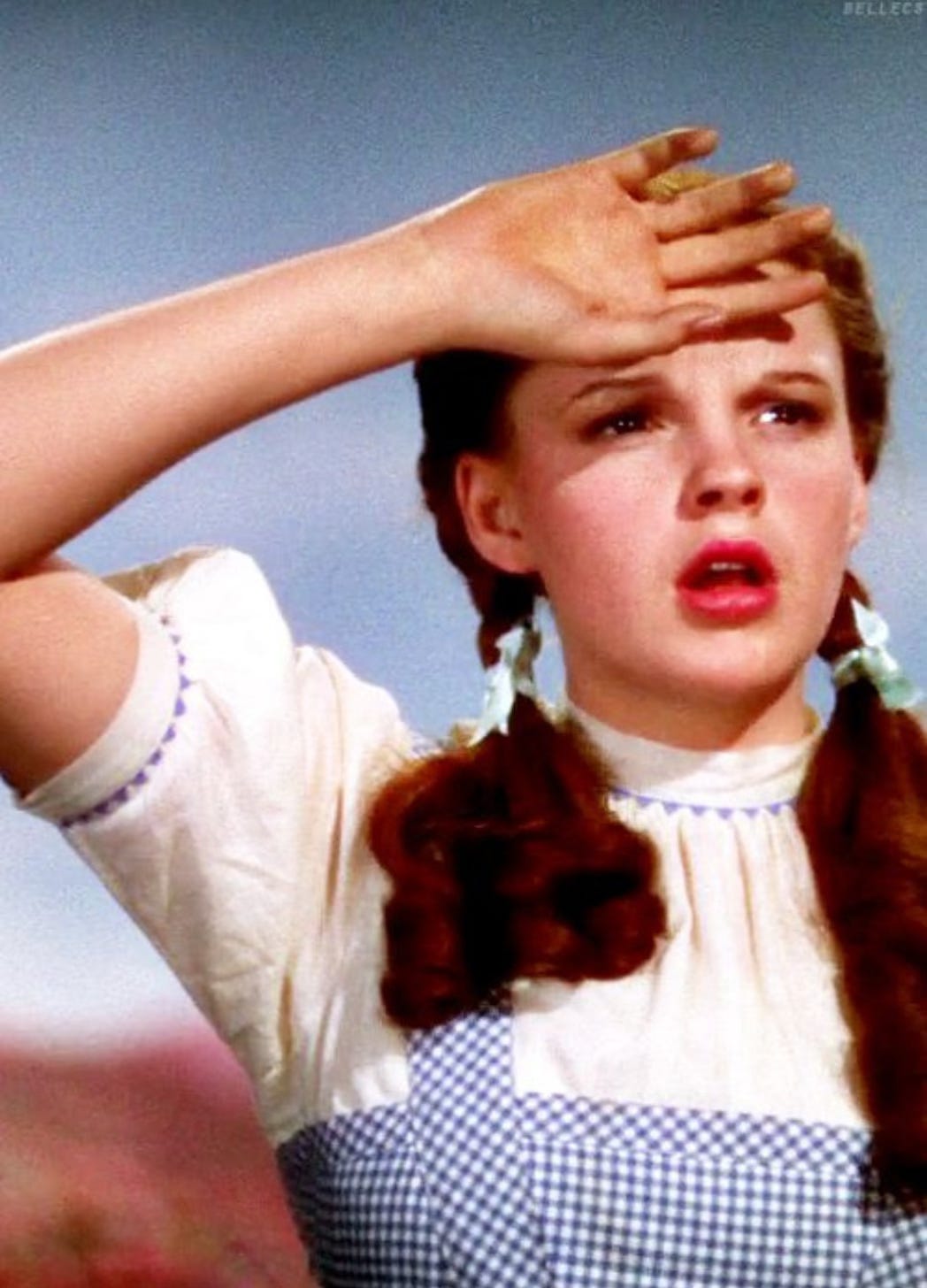Authors Have To Adapt: The Chilling Truth About AI
Because writers, we're not in Kansas anymore
I had a dream
When I was a child, I dreamed of being a writer. As a young, aspiring novelist, I thought of books as if they were permanent, a legacy to treasure and to be handed down through the generations. I imagined that if I were to become a published author, one day, a young person like me would pick up my novels and open the gold-embossed cover, slide a hand across the marbled inner paper and inhale the scent of paper and ink before beginning to read, and my words would reach through time and forge a connection between us. Oh, how naive.
This is the era where the average British writer scapes by on £7,000 a year; where the fortunate few are like rock stars, royalty or Premier League players; where the UK all-time best-selling list is dominated by Harry Potter, Dan Brown and Fifty Shades of Grey; where it’s more important to be a celebrity than a writer if one wants to sell books.
When my first novel came out in 1995 there was little data on how many books were published that year, but I can definitively say that a shed-load more are published today. This year 500,000 to one million books were published worldwide - a figure that swells to four million if you include self-published books. Few books printed in 2023 were lucky enough to be in hardback, let alone with a title in gold and a fancy flyleaf; ten per cent of all newly printed books were pulped, and worldwide, 320 million books ended up in landfill.
The rock stars and royalty of writing
This is the era where the average British writer scapes by on £7,000 a year; where the fortunate few are like rock stars, royalty or Premier League players; where the UK all-time best-selling list is dominated by Harry Potter, Dan Brown and Fifty Shades of Grey; where it’s more important to be a celebrity than a writer if one wants to sell books. This is a time when books are measured by how many fit in a box, publishers have to pay sellers for shelf-space, contracts are scrapped if sales don’t match spreadsheet predictions; this is Kindle and Audible and Amazon; this is writing as ‘content’; this is the era where authors are expected to be brand managers, publicists and social media gurus, look good on reels and trend on BookTok; this is the age of influencers and algorithms.
And into this milieu, one in which the majority of writers now need a wealthy partner or another job to remain a writer, Artificial Intelligence (AI) has thundered in like the tornado in The Wizard of Oz. We may have faced a myriad of changes over the past quarter of a century in the book industry, but writers, we are not in Kansas anymore. There will be no clicking of our ruby shoes and wishing AI away.
What is AI?
Let’s take a step back for a moment though, to define this whirlwind. By generative AI, what we mean are large language models (LLMs) such as ChatGPT (Chat Generative Pre-trained Transformer), Bard, Bot and LLaMa. Inspired by the way humans think, these are statistical models that analyse vast amounts of data, searching for connections and patterns between words and phrases, and which can be trained by humans. In fact, they’ve already been trained - using our words.
Companies such as Meta, Bloomberg and OpenAI stole 191,000 books and created a dataset called Books3. It’s often assumed that famous authors’ work has been fed into the models: indeed writers, including Michael Pollen, Zadie Smith, Margaret Atwood, James Patterson, Stephen King and
have all had their work pirated without consent or payment. I’m considered a mid-list author - I’ve won prizes and had twelve books published but I’m not a best-seller - yet I too am one of the writers whose books have been taken without my knowledge. And it was finding this out that really got me worried and start looking into AI, as otherwise, I might well have kept my head in the sand and hope it would all blow over…A writer dreamt up AI
In fact, a writer invented a programme like ChatGPT way back in 1995. Galatea 2.2 is a pseudo-autobiography, written by and about novelist Richard Powers who takes a position as Humanist-in-Residence at the Center for the Study of Advanced Sciences. There he meets Philip Lentz, a cognitive neurologist who is modelling the human brain using computer-based neural networks. Lentz wants Powers to train the neural net using the greatest novels of our time. Through repeated tutorials, the device grows gradually more worldly, until it demands to know its own name, sex, race, and reason for existing.
Powers wrote: “Speech baffled my machine. Helen made all well-formed sentences. But they were hollow and stuffed. She sorted nouns from verbs, but, disembodied, she did not know the difference between thing and process, except as they functioned in clauses. Her predications were all shotgun weddings. Her ideas were as decorative as half-timber beams that bore no building load.”
Powers’ chilling prescience aside, what will the impact be - particularly as AI has already been quietly running in our phones and our laptops for over ten years, and considering that when generative AI was released in November 2022, it reached 10 million users in only two months? Well, clearly, we don’t know yet but the future isn’t what it used to be.
Oxford University economists, Drs Carl Frey and Michael Osborne, predict 40% of jobs will be lost to AI by 2050; Goldman Sachs predicts the loss of 300 million jobs - that’s two-thirds of the jobs in Europe and America - potentially within a decade.
The authors of the Goldman Sachs report, Joseph Briggs and Jan Hatzius, write:
“Despite significant uncertainty around the potential of generative AI, its ability to generate content that is indistinguishable from human-created output and to break down communication barriers between humans and machines reflects a major advancement with potentially large macroeconomic effects.”
We are already seeing the effects of AI
We are already witnessing some of these effects: John Burn-Murdoch, chief data reporter for the Financial Times, recently described a US study: “the researchers showed that within a few months of the launch of ChatGPT, copywriters and graphic designers on major online freelancing platforms saw a significant drop in the number of jobs they got, and even steeper declines in earnings. This suggested not only that generative AI was taking their work, but also that it devalues the work they do still carry out.” Frey confirms the finding, telling BBC News "What ChatGPT does, for example, is allow more people with average writing skills to produce essays and articles. Journalists will therefore face more competition, which will drive down wages.”
What affect with AI have on authors?
So what does this mean for authors? Cliff Fluet, a law Partner at Lewis Silkin who advises clients in the Music and Entertainment Industry, describes the launch of AI as revolutionary as the impact of steam and electricity during the Industrial Revolution, and the last human-only innovation. This sounds somewhat scary, but Fluet qualifies his assertion by saying that writers need to think about AI as a set of tools, not an entity, that can be used by writers and publishers, and which might be used to generate book recommendations, content for marketing, produce plot ideas, edit, proofread, analyse market trends and translate books. This sounds very like a system that will eliminate journalists, authors, copy editors, proofreaders and translators, not to mention illustrators and voice-over artists.
However, it is worth remembering that AI generates text based on patterns and the data that it’s been trained on. It lacks creativity, nuance and critically, emotional intelligence. These are all skills that writers are known for, if not in their daily lives, then certainly in their work. Some of us may have a “splinter of ice in the heart” as Graham Greene observed, but what we are able to do is empathise and thus forge connections with others across time and space - or even, as Powers has done, invent ChatGPT many years before it came into existence.
Generic, hackneyed, bland?
I would argue that at the moment, AI has but a simulacra of emotions, since it is copying emotive words and phrases rather than understanding them. What it produces is frequently generic, hackneyed and bland. Even checking grammar can be a creative process: where a poet should put a full stop could be debated ad infinitum. Think of AI sub-editing Irvine Welsh’s Trainspotting:
“People think it's all about misery and desperation and death and all that shite, which is not to be ignored, but what they forget is the pleasure of it. Otherwise we wouldn't do it. After all, we're not fucking stupid. At least, we're not that fucking stupid.”
In fact, ChatGPT agrees. I asked it whether it would put writers out of a job and it thought for approximately five seconds and then responded with an opinion uncannily like my own, stated clearly but soullessly:
AI can be a valuable tool for writers, helping with tasks such as generating ideas, providing grammar and style suggestions, or even assisting in the drafting process. However, the unique human perspective, creativity, and ability to connect with emotions and experiences are aspects of writing that AI currently struggles to replicate.
Of course, what I would argue we do want, as creatives, is to be asked if our work can be used to train AI and to be acknowledged and paid for those months, if not years spent labouring over sentences. We also need safety measures in place, so that as Fluet claims, AI will not be our last human invention. No one wishes to find themselves in any of the scariest scenarios outlined by one of AI’s own creators, Mustafa Suleyman, co-creator of DeepMind, the most advanced AI research outfit in the world, who describes in his book, The Coming Wave, the catastrophes in store for us from genetically-engineered viruses to killer drones the size of bees. Let us hope, at the very least, that ChatGPT doesn’t learn to be an emotional creature, as Richard Powers’ creation did.
What’s the horsepower?
If AI truly is as revolutionary as steam or electricity, then it might be worth delving back to the past for insights into our future. In the 19th century, horses were almost exclusively used to transport people and goods and to keep the wheels of industry in motion. Then the car was invented. Professor David Runciman, from the Department of Politics and International Studies at Cambridge University, wrote in the Guardian,
“When the first model-T Ford (22 horsepower) rolled off the production line in 1908 there were around 25 million horses in the United States, alongside 90 million people. When the first Ford Falcon (260 horsepower) appeared in 1960, there were just 3 million horses left – and nearly 180 million people. The horse as worker was effectively obsolete.”
Like the automobile, AI is here to stay and we need to adapt. As a trending post on X by Santiago put it:
“AI will not replace you. A person using AI will.”
Thankfully, writers are not one-trick ponies.
Unlike the horse, we can and we will adapt.
Thank you for reading. Let me know what you think. Sanjida x
Don’t feel able to subscribe? Perhaps you’d like to buy me a coffee instead?





